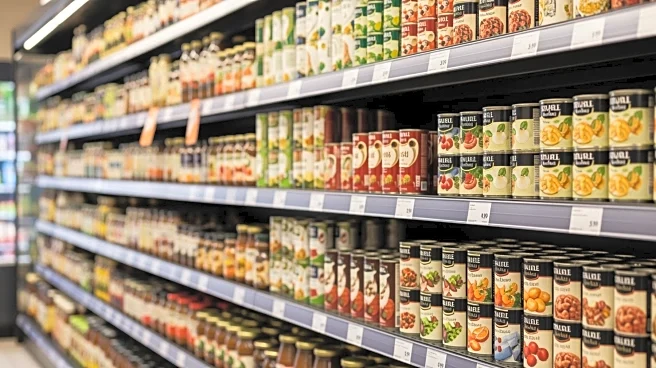What's Happening?
Albertsons is planning to significantly invest in its private label brands to boost customer loyalty and provide relief from inflationary price increases. CEO Susan Morris announced during a conference call discussing the company's Q2 results that Albertsons aims
to increase its private label penetration from 25% to 30%. This move follows similar strategies by other major grocery retailers like Target, Walmart, and Amazon, who have also expanded their private label offerings. Albertsons reported a 2% revenue growth in Q2, reaching $18.9 billion, with identical-store sales rising by 2.2% and digital sales increasing by 23%. The retailer also saw a 13% increase in loyalty program membership, reaching 48.7 million members.
Why It's Important?
The expansion of private label brands by Albertsons is significant as it reflects a broader trend in the grocery industry where retailers are seeking to enhance customer loyalty and mitigate the impact of inflation. By increasing private label penetration, Albertsons can offer more competitive pricing and potentially improve its profit margins. This strategy is crucial in a market where consumers are increasingly price-sensitive due to economic pressures. The move could also intensify competition among major grocery chains, prompting further innovation and price adjustments in the sector.
What's Next?
Albertsons will likely continue to invest in its private label brands, aiming to achieve the 30% penetration target. This could involve expanding product lines and enhancing marketing efforts to attract more customers. The company may also explore partnerships or acquisitions to strengthen its private label offerings. As Albertsons progresses with this strategy, other retailers might respond by further developing their own private label products, potentially leading to a more competitive market landscape.
Beyond the Headlines
The focus on private label brands raises questions about consumer perceptions and the quality of these products compared to national brands. As retailers push for higher penetration, they must ensure that private label products meet consumer expectations in terms of quality and value. Additionally, this trend could influence supply chain dynamics, as retailers may seek to optimize sourcing and production processes to support their private label growth.















